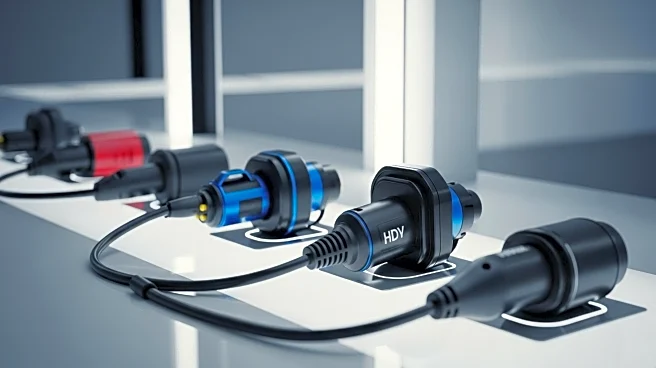What is the story about?
What's Happening?
Automakers in the United States are transitioning to Tesla's North American Charging Standard, which has led to the introduction of new EV charging adapters. General Motors (GM) has announced the release of three additional adapters to help customers access various EV chargers with different charging rates and standards. This move aims to provide flexibility for EV owners, although it may complicate the charging process as households could end up owning multiple adapters. The transition comes as the federal tax credit for EVs is set to expire, which has sparked concerns about a potential decline in EV sales. Automakers are expected to mitigate this impact by offering price reductions. The shift to Tesla's charging standard represents a significant change in the EV industry, affecting how consumers charge their vehicles.
Why It's Important?
The transition to Tesla's charging standard and the introduction of new adapters are crucial developments in the EV industry. This change could influence consumer behavior and the adoption rate of electric vehicles in the U.S. The expiration of the federal tax credit poses a challenge, potentially leading to decreased EV sales. However, automakers may counteract this by offering price reductions, which could sustain market interest. The availability of multiple adapters enhances charging flexibility but may also complicate the user experience. This shift highlights the evolving landscape of EV infrastructure and the need for standardization to support widespread adoption. Automakers that adapt quickly to these changes may gain a competitive edge in the market.
What's Next?
As automakers continue to transition to Tesla's charging standard, further developments in EV infrastructure are anticipated. Companies may introduce more adapters or alternative solutions to simplify the charging process for consumers. The impact of the federal tax credit expiration will be closely monitored, with automakers likely adjusting pricing strategies to maintain sales momentum. Stakeholders, including government agencies and industry leaders, may engage in discussions to address standardization and support the growth of the EV market. The ongoing evolution of charging standards and infrastructure will play a critical role in shaping the future of electric vehicle adoption in the U.S.
Beyond the Headlines
The shift to Tesla's charging standard raises broader questions about the standardization of EV infrastructure and its implications for consumers and manufacturers. The complexity introduced by multiple adapters may prompt discussions on the need for universal charging solutions. Additionally, the expiration of the federal tax credit highlights the importance of government incentives in driving EV adoption. As the industry navigates these changes, ethical considerations regarding accessibility and environmental impact may emerge. Long-term, the transition could influence regulatory policies and the strategic direction of automakers as they adapt to new market dynamics.














